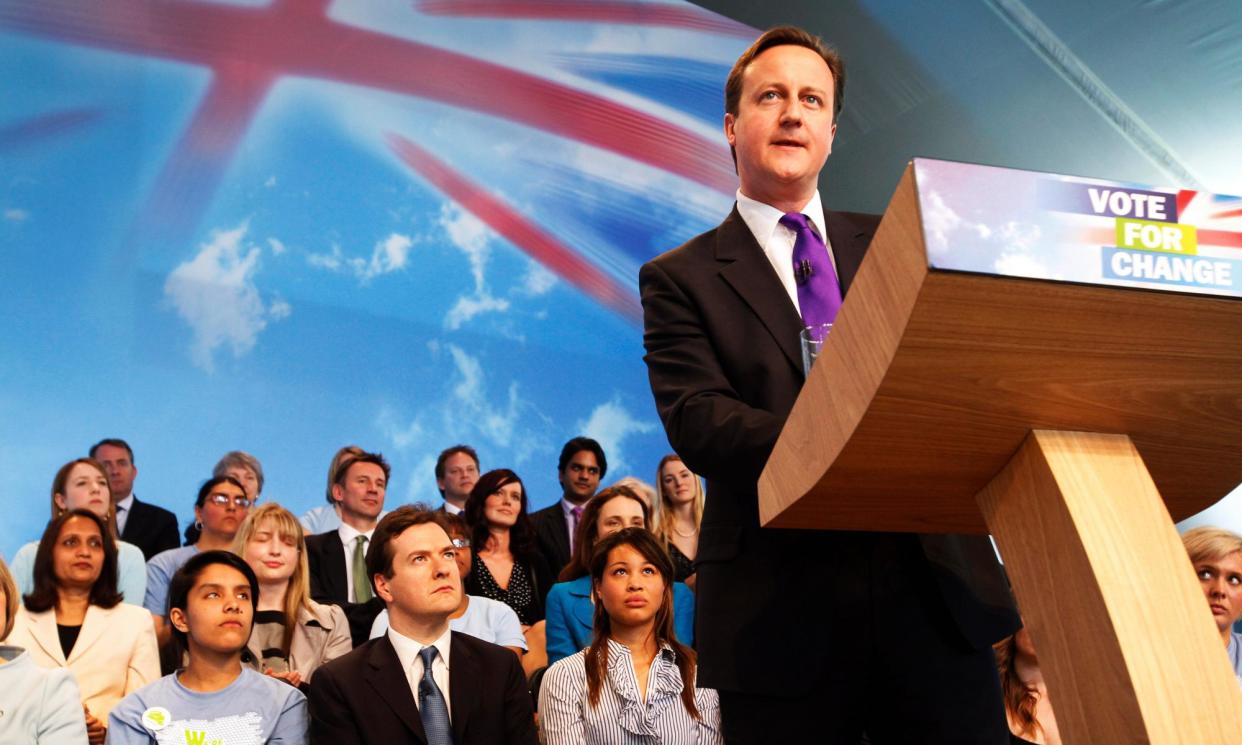Tories’ 14 years in power will be remembered for Brexit, cuts and chaos

The 14 years of Conservative rule – up to the calling of an election that Labour is widely expected to win – will have seen five prime ministers, seven chancellors, eight foreign secretaries and no fewer than 16 housing ministers.
But the numbers that are most likely to resonate with a bruised electorate are more everyday ones. By some reckonings the average Briton is about £10,000 a year worse off in real terms than in 2010, when the bright-eyed Conservative-Liberal Democrat coalition took over from Labour.
Similarly likely to shape the election outcome and future assessments of this era are the figures of 4.3 million children living in relative poverty and the 7.5 million-strong NHS waiting list in England.
The Conservatives will argue, with some force, that a lot of this is down to entirely unexpected and destabilising events, particularly the Covid pandemic and Russia’s invasion of Ukraine.
But when the social history books are being compiled on this 14-year period, as well as the ushering in of Brexit, critics will point to what is arguably the policy that shaped the Tory stranglehold on politics more than anything else: austerity.
This was the defining mission of David Cameron’s shiny 2010 administration, cheerfully waved through by the Tories’ Lib Dem coalition partners: an unprecedented squeeze on public spending, particularly focused on everyday services delivered by councils, ranging from libraries to sports facilities.
Along with this came an effort to crack down on benefit spending, a continuous thread across the 14 years, from the George Osborne “strivers versus shirkers” narrative to the 2017 innovation of the two-child benefit cap, identified by some as one of the single biggest contributors to family poverty in UK history.
If this was the broader theme of the past 14 years of Tory government, it has been cloaked in what felt like a never-ending veneer of political drama.
At the dawn of the Cameron-Nick Clegg coalition, joint government by compromise felt daringly novel and exciting for UK politics. Little did we know, but it was a sleepy lull by comparison with what came next.
Cameron led his party to outright victory in 2015 pledging stability against “chaos with Ed Miliband”, while also placating his right-leaning Eurosceptic MPs with the promise of an in/out referendum on EU membership, one of the biggest political gambles in modern UK history.
Cameron’s curse was to believe himself to be a congenitally lucky politician: PM by 43, he had already sought to settle two other seemingly intractable issues with referendums – the Lib Dems’ demand for voting reform and Scottish independence. Both times he had won.
The third time went wrong. Before the Brexit vote, Cameron and his party misjudged the anti-establishment mood, the campaigning genius of Nigel Farage and Boris Johnson’s decision to hitch his political career to the leave cause. He was humiliated.
The referendum result on 23 June 2016 saw Cameron out of No 10 and very soon out of parliament. It marked the beginning of a second stage of the 14 years, one generally marked by political chaos.
Theresa May spent three years in Downing Street, and in that time passed barely a single week without controversy or dispute, much of this down to Brexit. Her decision to promise Tory Brexiters the most robust of departures from the EU collided inevitably with the practical difficulties, plunging her party into near civil war.
Almost the definition of an unlucky prime minister, May made her own Cameron-style gamble, calling a snap election in 2017, and managed to lose her majority against a Jeremy Corbyn-led Labour party that the Tories had not taken seriously.
Her eventual removal in the summer of 2019 brought in the third act of Tory rule, in which a party that has long viewed itself as the natural inhabitant of stable rule first won an 80-seat majority, in 2019, and then managed to throw it all away.
Some blame must be placed on Conservative MPs and members who first chose Johnson, despite years of indicators that he was a fundamentally unserious character, as would be seen in the tawdry controversy of lockdown-breaking parties that deposed him. Then came Liz Truss, whose ability to last no more than 49 days in No 10 perhaps sums up her suitability for the job.
We are now in what may be the final scene of the Conservatives’ final act, with Sunak having managed to steady the ship while doing nothing to make the party appear more appealing to voters.
As the 14-year reign slips away in a fog of policies – some of which may feel more performative than meaningful, from the Rwanda deportation scheme to the decision to appoint a “minister for common sense” – what will the country make of this era if and when it is over?
For many, there will be relief. Most governments run out of steam after so long in office, and if any one thing propels Labour’s Keir Starmer into power it will be that most irresistible of political sentiments: it’s time for a change.
Others may feel almost a retrospective confusion. It is hard to think of another period of UK politics that summons up such a strong sense of what-the-hell-was-that-all-about?.
But in everyday lives up and down the country, with about 2.5 million Britons using food banks, many public services running on fumes and a pervading sense of nothing really working any more, there could well be a feeling that, to borrow a phrase, things can only get better.
Can they? Labour will try its hardest. But as political inheritances go, it is hugely unpromising.

 Yahoo News
Yahoo News 
